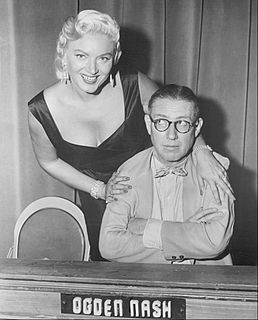A Quote by Thomas Sowell
The more adaptability exists for a given kind of decision, the less risky it is to make plans for the future, and therefore the more likely it is that more people will make more plans in such areas.
Related Quotes
What does labor want? We want more schoolhouses and less jails; more books and less arsenals; more learning and less vice; more leisure and less greed; more justice and less revenge; in fact, more of the opportunities to cultivate our better natures, to make manhood more noble, womanhood more beautiful, and childhood more happy and bright.
The decision to get married will impact one's life more deeply than almost any decision in life. Yet people continue to rush into marriage with little or no preparation for making a marriage successful. In fact, many couples give far more attention to making plans for the wedding than making plans for marriage. The wedding festivities last only a few hours, while the marriage, we hope, will last for a lifetime
The way to make better decisions is to make more of them. Then make sure you learn from each one, including those that don't seem to work out in the short term: they will provide valuable distinctions to make better evaluations and therefore decisions in the future. Realize that decision making, like any skill you focus on improving, gets better the more often you do it.
People who expect to feel guilty tend to be more sympathetic, to put themselves into other people's shoes, to think about the consequences of their behaviour before acting, and to treasure their morals. As a result they are less prone to lie, cheat or behave immorally when they conduct a business deal or spot an opportunity to make money, studies suggest. They are also likely to make better employees because people who think less about the future results of their actions are more likely to be late, to steal or to be rude to clients.
When you are trying to impress people with words, the more you say, the more common you appear, and the less in control. Even if you are saying something banal, it will seem original if you make it vague, open-ended, and sphinxlike. Powerful people impress and intimidate by saying less. The more you say, the more likely you are to say something foolish.
Abracadabra, thus we learn
The more you create, the less you earn.
The less you earn, the more you're given,
The less you lead, the more you're driven,
The more destroyed, the more they feed,
The more you pay, the more they need,
The more you earn, the less you keep,
And now I lay me down to sleep.
I pray the Lord my soul to take
If the tax-collector hasn't got it before I wake.
Auto repair, piloting, skiing, perhaps even management: these are skills that yield to application, hard work, and native talent. But forecasting an uncertain future and deciding the best course of action in the face of that future are much less likely to do so. And much of what we've seen so far suggests that a large group of diverse individuals will come up with better and more robust forecasts and make more intelligent decisions than even the most skilled "decision maker."
I teach something called The Law of Probabilities, which says the more things you try, the more likely one of them will work. The more books you read, the more likely one of them will have an answer to a question that could solve the major problems of your life.. make you wealthier, solve a health problem, whatever it might be.
Poorly planned and stressful vacations eliminate the positive benefit of time away. The less the stress, the more likely you will experience a positive benefit from the time off. A positive, well-managed vacation can make you happier and less stressed, and you can return with more energy at work and with more meaning in your life.




































